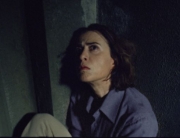Inspired by real-life events, To Kill a Man has honorable intent. It wants to put you in the place of a man whose family is being harassed by thugs and wants you to understand just what it may take to push said man over the edge. It’s a very serious film wanting you to take a very serious subject very seriously. I applaud it for that. Unfortunately, it’s not a very good film, but a well-made one, and there’s a difference.
Jorge (Daniel Candia) gets mugged by a gang of local thugs led by Kalule (a marvelous Daniel Antivolo) on his way from picking up a birthday cake for his 18-year-old son. The son simmers. The father is resigned. Later that evening, the son decides to confront Kalule. In his bedroom, Jorge hears gunshots, and he ventures out up the street to find his son wounded in an outdoor stairway leading to Kalule’s apartment, and, in possibly the most surprising scene in the film, Kalule makes it look like Jorge’s son was the aggressor. The ploy doesn’t work, however, and Kalule is sentenced to prison. He is released two years later and picks up where he left off with renewed vigor. Jorge comes to a crossroads. And he picks a path.
We, the audience, are observers, and we are not asked to get inside the characters’ heads. Rather, we watch their actions. And everything, even the violence that occurs, is understated and flows seamlessly from the rhythm of life. But in separating us from the motivations of the characters and dulling the tension that naturally occurs when one is being harassed and possibly thinking illicit, murderous thoughts, the director and screenwriter Alejandro Fernández Almendras takes away our sympathies instead of enhancing them. It’s clearly his intention, and he executes it well, but the results are tepid. The ending and change of heart of Jorge is so diffuse and simultaneously so abrupt that it doesn’t seem realistic, which is odd in a film that trumpets a kind of realism.
That being said, the performances are very good, and the cinematography is excellent. The world the film is set in, a depressed, sickly exurb of a city, is vividly realized as is the bureaucracy that Jorge and his family are up against. One just wishes we were given a real reason to care.
PS: I would like to declare a moratorium on composers scoring their films with unsettling string quartets. It’s becoming hilariously clichéd. Just because Jonny Greenwood could do it in There Will Be Blood doesn’t mean everyone else can, too.

















Leave A Comment